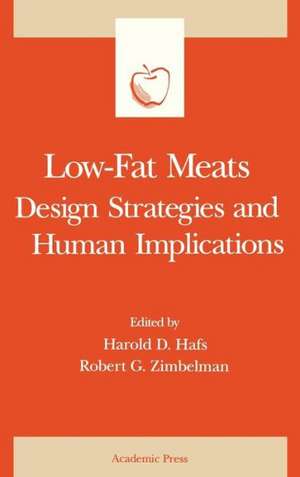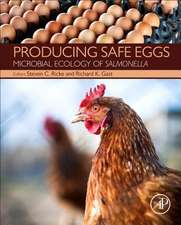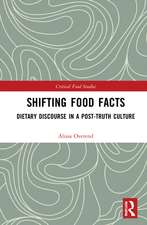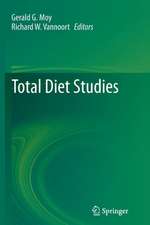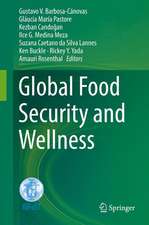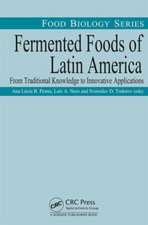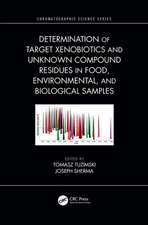Low-Fat Meats: Design Strategies and Human Implications: Food Science and Technology
Editat de Harold D. Hafs, Robert G. Zimbelman Steve Tayloren Limba Engleză Hardback – 12 dec 1994
Din seria Food Science and Technology
- 25%
 Preț: 618.61 lei
Preț: 618.61 lei - 22%
 Preț: 1024.09 lei
Preț: 1024.09 lei -
 Preț: 357.25 lei
Preț: 357.25 lei - 22%
 Preț: 842.01 lei
Preț: 842.01 lei - 15%
 Preț: 490.10 lei
Preț: 490.10 lei - 18%
 Preț: 1359.95 lei
Preț: 1359.95 lei - 18%
 Preț: 1674.26 lei
Preț: 1674.26 lei - 8%
 Preț: 323.02 lei
Preț: 323.02 lei - 30%
 Preț: 614.87 lei
Preț: 614.87 lei - 18%
 Preț: 2090.27 lei
Preț: 2090.27 lei - 15%
 Preț: 489.26 lei
Preț: 489.26 lei - 29%
 Preț: 1408.52 lei
Preț: 1408.52 lei - 23%
 Preț: 566.29 lei
Preț: 566.29 lei - 13%
 Preț: 385.35 lei
Preț: 385.35 lei - 15%
 Preț: 498.29 lei
Preț: 498.29 lei - 30%
 Preț: 2111.13 lei
Preț: 2111.13 lei - 18%
 Preț: 1827.77 lei
Preț: 1827.77 lei - 18%
 Preț: 2081.08 lei
Preț: 2081.08 lei - 18%
 Preț: 2212.49 lei
Preț: 2212.49 lei - 18%
 Preț: 2220.38 lei
Preț: 2220.38 lei - 18%
 Preț: 2221.95 lei
Preț: 2221.95 lei - 23%
 Preț: 606.02 lei
Preț: 606.02 lei - 18%
 Preț: 2078.06 lei
Preț: 2078.06 lei - 23%
 Preț: 415.15 lei
Preț: 415.15 lei - 18%
 Preț: 2102.06 lei
Preț: 2102.06 lei - 23%
 Preț: 376.17 lei
Preț: 376.17 lei - 18%
 Preț: 1604.01 lei
Preț: 1604.01 lei - 18%
 Preț: 2770.03 lei
Preț: 2770.03 lei - 18%
 Preț: 1313.74 lei
Preț: 1313.74 lei - 15%
 Preț: 537.13 lei
Preț: 537.13 lei - 18%
 Preț: 2211.41 lei
Preț: 2211.41 lei - 18%
 Preț: 2233.32 lei
Preț: 2233.32 lei - 27%
 Preț: 1420.06 lei
Preț: 1420.06 lei - 18%
 Preț: 1395.65 lei
Preț: 1395.65 lei - 31%
 Preț: 1702.47 lei
Preț: 1702.47 lei - 18%
 Preț: 1926.00 lei
Preț: 1926.00 lei - 29%
 Preț: 1409.34 lei
Preț: 1409.34 lei - 18%
 Preț: 1800.14 lei
Preț: 1800.14 lei - 18%
 Preț: 1336.46 lei
Preț: 1336.46 lei - 18%
 Preț: 1959.17 lei
Preț: 1959.17 lei - 31%
 Preț: 1690.32 lei
Preț: 1690.32 lei - 22%
 Preț: 836.17 lei
Preț: 836.17 lei - 18%
 Preț: 1941.91 lei
Preț: 1941.91 lei - 18%
 Preț: 1222.82 lei
Preț: 1222.82 lei - 18%
 Preț: 701.01 lei
Preț: 701.01 lei
Preț: 553.64 lei
Preț vechi: 719.02 lei
-23% Nou
Puncte Express: 830
Preț estimativ în valută:
105.95€ • 115.05$ • 88.100£
105.95€ • 115.05$ • 88.100£
Carte tipărită la comandă
Livrare economică 22 aprilie-06 mai
Preluare comenzi: 021 569.72.76
Specificații
ISBN-13: 9780123132604
ISBN-10: 0123132606
Pagini: 330
Dimensiuni: 152 x 229 x 21 mm
Greutate: 0.66 kg
Editura: ELSEVIER SCIENCE
Seria Food Science and Technology
ISBN-10: 0123132606
Pagini: 330
Dimensiuni: 152 x 229 x 21 mm
Greutate: 0.66 kg
Editura: ELSEVIER SCIENCE
Seria Food Science and Technology
Public țintă
This book will be of tremendous interest to food technologists, meat pakers, purveyors, and graduate students and faculty in animal and agricultural science, food technology, and nutrition.Cuprins
Improving Carcass Composition Through Selective Breeding. Nutrition and Feeding Management to Alter Carcass Composition of Pigs and Cattle. Human Nutrition and Health Implications of Meat with More Muscle and Less Fat. Human Food Safety Evaluation of Repartitioning Agents. Evaluating Lower-Fat Meats from and Ethical Perspective: Is "Good for You" Always Good for You? Technology to Assess Carcass and Product Composition. Meat Evaluation Issues and Alternatives. Strategies for Reduced Fat Processed Meats. Growth, Metabolic Modifiers, And Nutrient Considerations. The Welfare of Physiologically Modified Animals. Carcass Composition of Animals Given Partitioning Agents. Sensory Characteristics of Meat from Animals Given Partitioning Agents. Reaction of Livestock Producers to Partitioning Agents. An Overview of the Meat-Packing Industry and Some Perspectives on Partitioning Agents. Potential to Alter Carcass Composition Through Genetically Modified Animals. Immunological Approaches to Modify Growth. Index.
